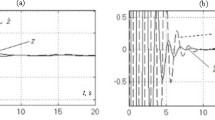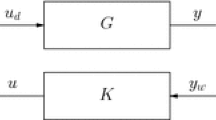Abstract
This paper deals with the identification of linear time—varying continuous—time systems whose parameters have bounded first-order time-derivative under square-integrable output noise. The proposed parameter updating algorithm is one of σ-modification type with Covariance Matrix. The Covariance Matrix updating rule is performed by using a modification with respect to standard previous estimation schemes used for time-invariant plants. Such a modification consists of including, apart from the standard ones in least-squares estimation with forgetting factor, two extra additive weighted terms involving the identity matrix as well as the second power of such a matrix with the appropriate signs. That parameter estimation strategy ensures that the norm of the covariance matrix is always finitely upper-bounded without using adaptation freezing techniques over a prescribed norm threshold. The main role played by the σ-modification relies on introducing a penalty for large values of the covariance inverse and the parametrical error. Furthermore, in the most general formalism setting, the knowledge of absolute upper-bounds on either the parameter vector or its time-derivative are not requested. The estimation scheme guarantees the asymptotic convergence of the prediction error to zero and that of the estimates to the true parameters under standard properties of persistent excitation of the input and controllability of both plant and filter realizations in the case when the plant is noise-free and either time-invariant after finite time asymptotically time-invariant. If the plant is slowly time-varying and the covariance matrix is updated with the standard least-squares rule, the variations of the integrals of the squares of the estimation vector and its time-derivative norms vary not faster than uniformly linearly with the interval lengths considered for integration. Furthermore, the overall changes are arbitrarily small over any finite time-interval provided that the time-derivative of the true parameter vector and the correction coefficients in the covariance updating rule are arbitrarily small.
Similar content being viewed by others
REFERENCES
Ioannou, P.A. and Datta, A., Robust Adaptive Control: A Unified Approach, IEEE Trans. Autom. Control, 1991, vol. AC-12, pp. 1765–1768.
Kreisselmeier, G. and Smith, M.C., Stable Adaptive Regulation of Arbitrary nth Order Plants, IEEE Trans. Autom. Control, 1982, vol. AC-27, pp. 720–722.
Nussbaum, R.D., Some Remarks on a Conjecture in Parameter Adaptive Control, Syst. Control Lett., 1983, vol. 3, pp. 243–246.
Martensson, B., The Order of any Stabilizing Regulator is Sufficient a priori Information for Adaptive Stabilization, Syst. Control Lett., 1985, vol. 6, pp. 87–91.
De la Sen, M., A Note on the Robust Adaptive Stabilization of a Class of Nominally First-Order Hybrid Systems, IEEE Trans. Autom. Contr., 1999, vol. AC-44, no. 1, pp. 43–48.
Le Yi Wang, Persistent Identification of Time-Varying Systems, IEEE Trans. Autom. Control, 1997, vol. AC-42, no. 1, pp. 66–82.
Ossman, K.A. and Kamen, E.W., Adaptive Regulation of MIMO Linear Discrete-Time Systems without Requiring a Persistent Excitation, IEEE Trans. Autom. Control, 1987, vol. AC-32, no. 5, pp. 397–404.
La Salle, J. and Lefschetz, S., Stability by Direct Lyapunov's Method with Applications, New York: Academic, 1967.
Burton, T.A., Stability and Periodic Solutions of Ordinary Differential and Functional Differential Equations, New York: Academic, 1987.
Doyle, J.C., Francis, B.A., and Tannenbaum, A.R., Feedback Control Theory, Singapore: Macmillan, 1992.
Wang, L.Y., Persistent Identification of Time-Varying Systems, IEEE Trans. Autom. Control, 1977, vol. AC-42, no. 1, pp. 66–82.
Narendra, K.S. and Annaswamy, A.M., Stable Adaptive Systems with Applications, Prentice Hall: Englewood Cliffs, 1989.
Author information
Authors and Affiliations
Rights and permissions
About this article
Cite this article
De la Sen, M. Identification of a Class of Linear Time—Varying Continuous—Time Systems. Automation and Remote Control 63, 246–261 (2002). https://doi.org/10.1023/A:1014247624829
Issue Date:
DOI: https://doi.org/10.1023/A:1014247624829




